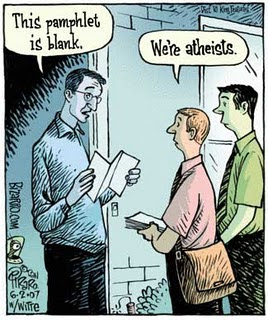After reading through my disagreement with John Loftus over appropriate tactics for debunk religion, Dom had a few questions:
If atheism, in and of itself, is a fairly slim and uninteresting belief (which, as an atheist, I think it is), and the interesting bit comes from the positive framework you build on top of your atheism, then what does it actually mean to talk about any atheist “side” to this debate that defines itself positively rather than negatively, as furthering an intellectual position rather than trying to tear down the other side’s because you think it’s dangerous? The only thing that really seems to unite you and Loftus in any meaningful way is that you both find Christianity dangerous for similar reasons, which is totally fine, but doesn’t strike me as enough to define an “atheist movement” or “atheist side of the debate”. When you talk about being disappointed at how Loftus’ questions represent “our side”, are you talking about anything beyond “people who intellectually oppose themselves to Christianity”? If so, given the relative lack of *inherent* content to atheism, how substantially can that “side” be defined and still be identified by the label “atheist”?
[Dom had more to say, well worth reading, in the thread]
He’s got a fair point. Almost nothing of interest is a necessary consequence of atheism. However, I still think that there are ways to be an atheist badly that go beyond simply misstating beliefs, lying, or failing to prepare for debate. Let me lay out a couple ways to go wrong:
Failures of Fact
Some ideas are common spurs that drive people to atheism, even if they are not necessary consequences of not believing in God (empiricism, skepticism, a buoyant enthusiasm for the sciences, etc). These ideas are so common that if you were to encounter an atheist who wasn’t convinced by the evidence for evolution or the importance of vaccines.
These still aren’t consequences of atheism or revelations reserved to atheists. These are, to the best of my knowledge, facts, and it happens to be the case that atheists are more likely than most to understand them, since they don’t run counter to any of the tenets of atheism. Contrast this with the dissonance and discomfort felt by biblical literalists when they confront these facts.
When atheists aren’t on the science side of an issue, I think it’s reasonable for the rest of us to get tetchy and talk about them letting the side down.
The beliefs described above are straightforward and (for those of us who pay attention to evidence) so reasonable as to be boring. Consider, instead, an interesting schism on the atheist side between relativists and absolutists.
Failures of Courage
There are beliefs that are fairly common among some atheists that are never claimed or defended as intrinsic parts of atheist philosophies.
Richard Dawkin’s contention that bringing your children up as religious constitutes child abuse is rooted in an understanding of morality as universal and urgent. He does not believe that he ought to be epistemologically modest about blatant abuse, and he does not believe that the facts that prove that it is abuse vary across cultures. In this understanding of morality, Dawkins, Catholicism, and I are all in agreement, even if we all three of us differ in our understanding of what constitutes abuse.
Atheists of this stripe do need to put up a defense/explanation of our own views, even if it introduces splits in our side. We think we’ve got a better grasp of Truth than you, and we want you to come aboard. If you’re making this kind of argument implicitly and not pairing it with a positive statement about your precepts, you’re engaging in lazy argumentation – blasting your opponent on his weak side while refusing to reveal your full argument for the sake of avoiding criticism or controversy. Definitely a case of letting the side down.
Failures of Vision
 |
| It’s really hard to find an image that illustrates ‘limited vision’ so here is the best result I could turn up for ‘small scope’ |
Atheists who want to pitch people on abandoning Christianity or religion generally but don’t want them to switch to anything in particular and don’t want to present an alternate idea of morality are also letting the side down, in my view.
They are opening the door to nihilism by only seeking to destroy, rather than to rebuild. If they believe that morality is important and that people who have had their grounding for morality shattered can easily connect with its actual precepts and grounding, I think they are being overly optimistic.
If they believe that the vision of morality put forward by a particular religion is wrong, but they don’t have anything to present as ‘right’ or don’t believe that any morality is really more ‘right’ than another, I don’t know why they bothered to attack religion in the first place. This relativist view undermines the very concept of morality and can be more destructive and harmful than the religion being debunked.














